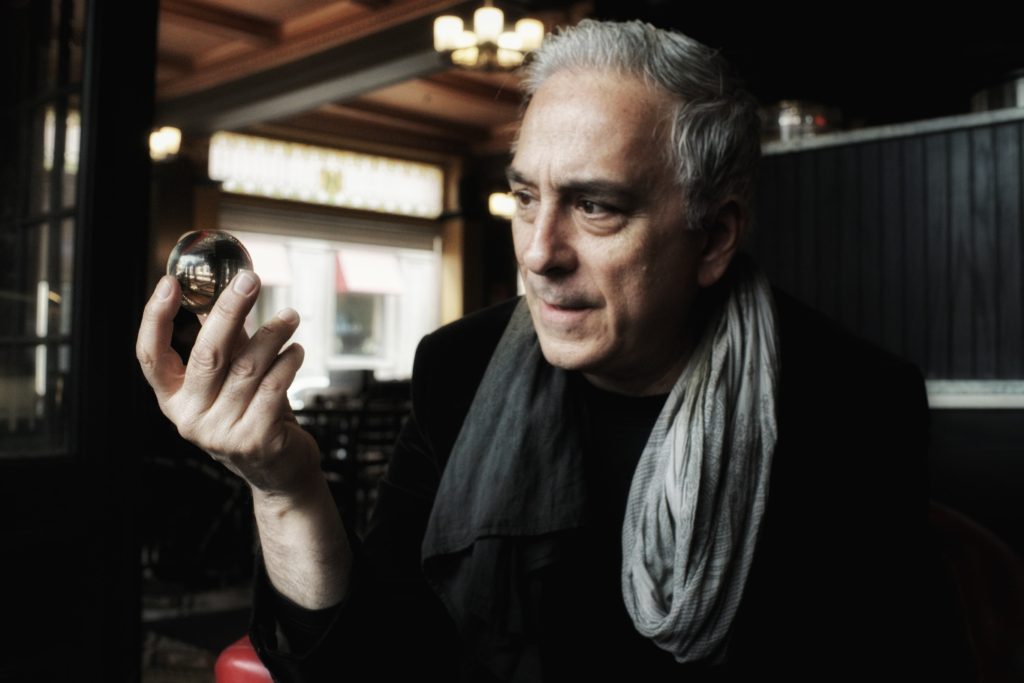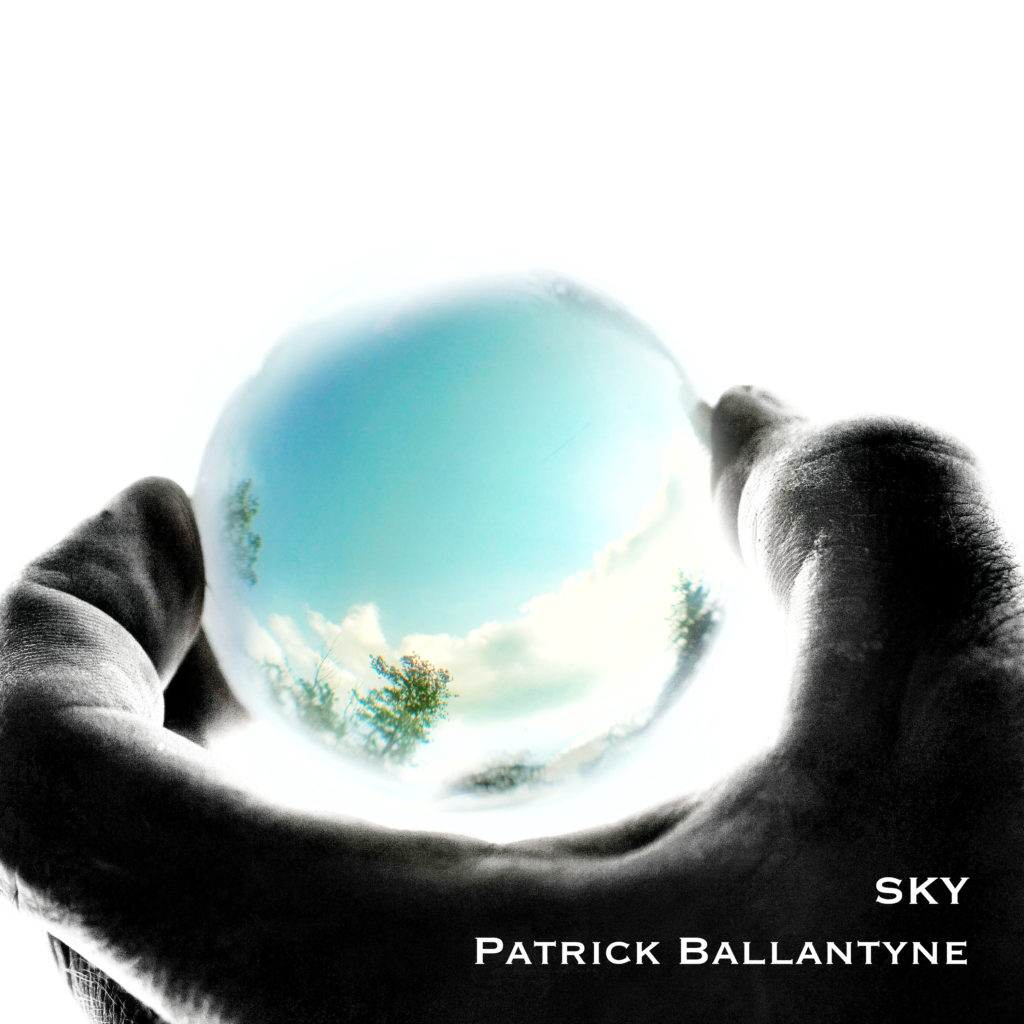
A successful full time lawyer by trade and training for many years, Patrick Ballantyne has also carved out a second career as a prolific and successful songwriter, collaborating with the likes of Meredith Shaw, Gordie Johnson of Big Sugar and The Trews among many others.
Sky is his fourth solo album and, in many ways, his most ambitious. It was released in May on Northwood Music, and is already garnering both critical and popular acclaim, not least for its sense of adventurousness and musical exploration.
Some of Ballantyne’s best work has come from times when he felt it necessary to challenge himself and his skills as a songwriter. His previous album, Calendar, released in 2017, saw him write, record and release one song a month for a calendar year, and then collecting all the songs and putting them into an album.
For Sky, it was a different tactic to tackle some different challenges – some self-imposed, others ‘gifted’ to him by the songwriting deities. One of the key questions was the big ‘why’. In an age of streaming and downloading and creators receiving a fraction of the financial payoff they used to 20 or even 10 years ago for their labours, why even bother writing, recording and releasing new music?
“It was probably fairly soon after Calendar was finished that I wanted to keep moving. That’s kind of what I do. I keep writing and every now and then a bunch of songs seem to fit together, and that’s what happened here. I think to some extent it was a bolt out of the blue, which of course is funny given the name of the album. It really came across to me as I was dealing with the futility of being a creator and how much frustration can attach itself to the act of issuing an album or trying to create music and be compensated for it. Times have changed so drastically in terms of getting compensated that sometimes you wonder why we do it,” said Ballantyne, from his law office in Toronto.
“The easy answer for me is I do it because I don’t know how not to. I have always written songs and I will always write songs, as long as the creative urge is there. But the deeper, almost existential issue is who hears it? Is it better just to keep it to yourself? How do you get people to pay attention to you? So, on this album there’s a song like We’re Rolling, which is just the struggle of creating and not knowing if anybody is going to hear it, and like it and listen to it. You just throw it out into the universe sometimes with precious little feedback. You have such high aspirations because you are so proud of the work, but at the end of the day you can’t control how its received. And in today’s climate, you’ve got seconds to grab people with a new song because they would prefer to hear something that they already know. Do you do it with the hope that somebody will listen? I don’t know, again, its existential and sounds much deeper than I actually intended it to be, but those are the thoughts that were going on in my brain when I was writing and recording Sky.
“And a lot of it has to do with inspiration – inspiration is fundamental, and without that you’re dead. The song Sky, the title track, for example, came out of an exercise of trying to force myself to write. I went into a real slump a few years back when nothing was coming out. I had to literally force myself to just pick up a guitar and record something. In that case, it was trying to move beyond inspiration and trying to force out something, but that’s where it starts. Beyond that, when you write, you’ve got to challenge yourself a little bit to create something that is at least interesting to your own ear.”
Ballantyne also challenged himself sonically to incorporate different instrumentation, a more full and lush production and just stretch himself as a composer and producer, which was something he enjoyed, and hopes audiences will also appreciate.
“You’ve got to take it places that people don’t expect and you’ve got to balance it a little bit sonically with the melody that doesn’t go quite where you think it’s going to go, or a structure that maybe is not so traditional. Structure is important, but sometimes knowing good structure and then throwing it out the window is equally important, just to challenge yourself and make the songs a little more interesting for yourself and for the people that are listening to it – it’s okay to allow them to be surprised by the direction that it went. That can happen lyrically as well, but for the most part on this album it’s a musical thing, or a chord change thing,” he explained.

“I was also having a bit of fun with this record in terms of sonic landscapes. There’s a lot of mellotron samples, and there’s pedal steel stuff on this album too. I was having a little more fun with the sound of the record with the reverb, trying to make it sound more interesting to me than just a traditional singer/songwriter album. And I played everything on it. And, it’s funny, up until a month before its release the record didn’t actually have a break in it. It was mixed and mastered as one 30 whatever minute song, because I had tried to link it all together and I always heard it as something you should listen to with headphones on in one fell swoop, like Yes’ Tales of Topographic Oceans or something like that. It wasn’t until the very end that we decided how to put the cuts in so that people could actually just listen to one or two songs. But it was very much meant to be something that you listen to in one piece.”
The song Dominos is emblematic of the aforementioned theme of the frustration faced by creator of any artistic medium trying to make a living while still staying true to their muse.
“You’re trying to get something going, you’re trying to keep your spirits up, but certainly it’s a tough slog, the economics are against you, there’s a lot of competition for attention. The dominos notion is that there’s one thing after another that can drag you down and frustrate you, falling like dominos. So, again, it’s not a particularly happy message, but its recognizing that it’s a real struggle. How many musicians do you know that have to get other gigs to just support themselves, to enable them to practise their art. Maybe it’s always been that way, but as much as these issues can fuel the art, it can also really challenge the art and make it really hard to really be the full artist that you want to be,” he said.
Many of Ballantyne’s best songs, including those penned with and for other artists, tend to be about the varied vicissitudes, pitfalls and poetic moments that happen within intimate relationships. Sky is no different with a couple of standout ‘relationship’ tracks to appeal to the lovelorn and the loved.
“With Beneath Your Skin the lyric contains fairly sexual imagery, but really what it’s getting at is you seeing some form of consummation. In the last verse it proves to be really just more of a desire than anything that is actually consummated; there really is no ultimate satisfaction. It’s that longing that ends up being frustrated, for whatever reason. Although it starts off pretty intense lyrically, like something big is about to happen, it turns out that, like in the first line of the song, you’re in a bourbon haze. You’re kind of imagining things and you’re letting your imagination, fueled by alcohol, take over for you. And at the end of the day, you’re really not achieving what you want to be achieving,” he explained, adding that Vicious in Your Vanity looks at an unsatisfactory relationship from a different point of view.
“That was a cowrite with Colin MacDonald [Trews]. He wrote those lyrics but again, rather than the singer in that song being the one who is striving, it’s really the person on the other end of it. They’re looking for something beyond what they’re getting in that particular scenario. So, it comes at the same sort of theme, but from the opposite side. The song is saying, you had it good, but you wanted more. You’re always searching for something else, even though what you have is already ideal.”
Even with these challenges and the way that the music making model keeps changing and shifting with the variable tides of technological advancement, Ballantyne said he is still committed to making full albums and still sees the value of listening to them in all one sitting.
“I know no other way to put music out than to make an album or certainly to make some sort of recording. I have always grown up listening to albums. Back when I was a kid a band would take a bunch of songs and put them on an album and there was nothing necessarily thematic in common or grandiose about it, it was a simple record with 10 to 13 songs on it. As I grew older, music became a bit more ambitious. You look at Pink Floyd’s Money; it was this lovely work of art, and you put the headphones on and you sat in front of the stereo and it worked beautifully as something that takes you away from your day, just like a movie might. And to me it’s even better than a movie because you’re letting your imagination flash the pictures on your brain, rather than whatever the director wants you to see,” he said.
“We’re talking about the 1970s here, and it was always magical to listen to Yes, who I love. They are sort of reaching something, like a bigger statement, something a bit more abstract or ambitious than the standard pop song. But they almost always had something accessible within the music. There were still pop songs buried in there. I have always loved the idea of losing myself into the 20 minutes of a side of an album. Even getting into the 1980s an album like Sandinista by The Clash was a triple album. I would just lose myself in that and not just one track at a time or two tracks at a time, but at least the 20 minutes it would take to get through a side of vinyl. It was just a really wonderful way of escaping into another world, and that’s how I have always viewed albums and what I would hope people would do with this one.”
For more information on Sky and show dates, visit https://patrickballantyne.com.
- Jim Barber is a veteran award-winning journalist and author based in Napanee, ON, who has been writing about music and musicians for a quarter of a century. Besides his journalistic endeavours, he now works as a communications and marketing specialist. Contact him at jimbarberwritingservices@gmail.com.
SHARE THIS POST:
